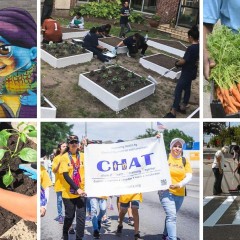There’s a lot of work going on in Houston to make the city more resilient. From individuals still working to build back homes and lives from Hurricane Harvey to public agencies pursuing billion-dollar infrastructure projects to reduce flooding impacts. Work is taking place at every scale and in every part of the city. The city’s recently released Resilient Houston strategy aims to connect across these multiple layers and address the acute threats of disasters and crises as well as chronic stresses that include issues ranging from lack of education access to environmental injustice.
Much of the work happening now is concentrated at the community level, where neighbors are identifying challenges and organizing toward solutions together. But, as with many efforts that take place at a hyperlocal level, scaling up and sustaining a program is difficult. Community efforts often revolve around volunteers giving their own time and money. In many cases, communities don’t have the chance to connect with those doing similar work in farther-flung parts of the city. If we want to strengthen our communities by building on existing efforts and assets, how do we connect residents to effective ideas that address our common problems? How do we share lessons learned? How do we overcome the limits of community efforts that result from a lack of resources, information or training?
These are some of the questions that the Kinder Institute attempts to address with its latest report, Community Resilience Initiatives: Building Stronger Neighborhoods in Houston. The report explores 21 community-driven efforts that are currently at work in the five pilot Complete Communities designated by Houston Mayor Sylvester Turner in 2017 — Third Ward, Second Ward, Gulfton, Acres Homes and Near Northside. Each of these communities has an action plan that identifies major challenges being faced and lays out desired interventions. The efforts highlighted in the report address some of the issues common to the action plans of all five communities. Six key elements that should underpin future community efforts are distilled from the discussion. To support future community work, we must:
► Build capacity for resident leadership
► Provide financial support to community initiatives
► Undertake community plans and public engagement in every community
► Provide residents with accessible technical information
► Support and develop community-level coordinating organizations
► Establish collaborations.
Establishing collaborations within communities and with outside partners is particularly critical. The report argues that making connections to broader city initiatives such as the Complete Communities program and Resilient Houston can help amplify localized efforts and replicate them in other parts of the city. It can also make the location and distribution of resources more streamlined. Likewise, the community efforts can inform and strengthen the citywide work by bringing knowledge of local issues, impassioned resident-leadership and existing organizations into larger efforts.
With Community Resilience Initiatives, the Kinder Institute hopes to share lessons learned from communities across Houston and the benefit of working with city efforts to tie community work to larger plans and processes. The takeaways highlighted in the report, though, are not limited to Houston. Communities across the country need support for grassroots efforts and need to participate in collaborations with broader efforts if we want to see sustainable and effective work implemented and scaled in our cities.
The Community Resilience Initiatives: Building Stronger Neighborhoods in Houston report was funded in part by Chevron.


